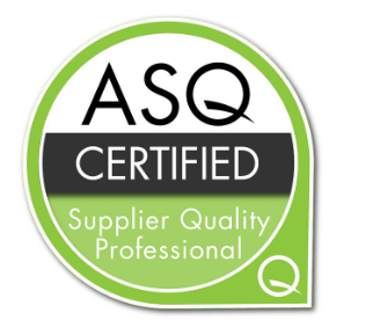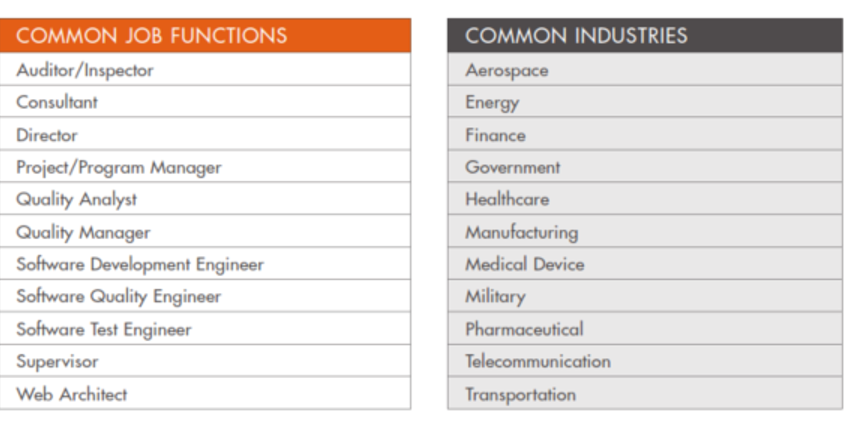
Start: 10 de septiembre, 2025


DESCRIPTION:
¿POR QUÉ CONVERTIRSE EN UN PROFESIONAL DE CALIDAD EN GESTIÓN DE SUMINISTROS CERTIFICADO?
Como Profesional Certificado de Calidad de Proveedores (CSQP) demostrarás tu conocimiento de los procesos de gestión de proveedores, desde el desarrollo estratégico hasta la implementación, así como las herramientas de gestión de riesgos que utilizarás para proteger tu negocio. Al desarrollar proveedores a través de una relación colaborativa y productiva, tanto el cliente como el proveedor se beneficiarán.
¿CUÁLES SON LAS COMPETENCIAS BÁSICAS DE UN CSQP?
Estrategia de proveedores mejorada que incluye gestión del ciclo de vida, análisis de costos de la cadena de suministro, acuerdos y contratos.
Sólidas técnicas de gestión de riesgos a través de análisis y estrategias preventivas, y control de mitigación.
Mejora de la selección de proveedores y los procesos de calificación de piezas a través de revisiones de diseño y calificación de piezas, procesos y servicios.
Seguimiento y mejora del rendimiento de los proveedores con métricas de proveedores y CAPA.
Seguimiento y mejora del rendimiento de los proveedores con métricas de proveedores y CAPA.
Gestión de la calidad del proveedor a través de auditorías de calidad, gestión de proyectos y evaluaciones de rendimiento.
Técnicas de gestión de relaciones que incluyen incorporación de proveedores, comunicación, liderazgo y colaboración.
Gobernanza empresarial, ética y cumplimiento en las áreas de confidencialidad, propiedad intelectual y leyes de cumplimiento.
Importante:
El participante debe tener conocimientos en el idioma inglés ya que el material y el examen son en este idioma.

¿CUÁL ES EL VALOR PARA SU EMPRESA TENER UN INTEGRANTE CON CONOCIMIENTOS DE CSQP?
El rendimiento de los proveedores bien gestionado puede ahorrarle a su empresa la pérdida de ingresos mediante un control operativo de alta calidad del rendimiento de la calidad general de los proveedores.
Aprovechar la garantía de calidad de los componentes que cumple o supera las especificaciones de diseño.
Obtener una fuerte ventaja competitiva cuando los proveedores reaccionan instantáneamente a la evolución de los mercados y las demandas de los clientes.
Mejorar el poder adquisitivo a través de datos precisos y oportunos de los proveedores.
Tomar mejores decisiones empresariales con datos actualizados de los proveedores.
Garantizar una calidad constante y constante del material.
Mejorar la calidad general a través del cumplimiento constante de los estándares de calidad definidos por los proveedores.
¿CUÁL ES EL VALOR PARA TI ESTAR ENTRENADO Y CERTIFICADO COMO CSQP?
Calificar para más puestos dentro de los entornos empresariales modernos
INFORMACIÓN DEL MERCADO DONDE LABORA UN CSQP

TENDENCIAS CLAVE DEL MERCADO DE UN CSQP
Se estima que la cadena de suministro mundial es una industria de 26 billones de dólares al año.
Entre 2015 y 2020, se estima que el número de puestos de trabajo disponibles en las industrias de la cadena de suministro crecerá un 26% (Fuente: Ejecutivo de la COSUDE 2016).
En la actualidad, la relación entre la oferta y la demanda de puestos de trabajo por persona cualificada es de seis a uno. La mayoría de las vacantes se encuentran en puestos de mandos intermedios, donde actualmente hay un déficit del 54%.